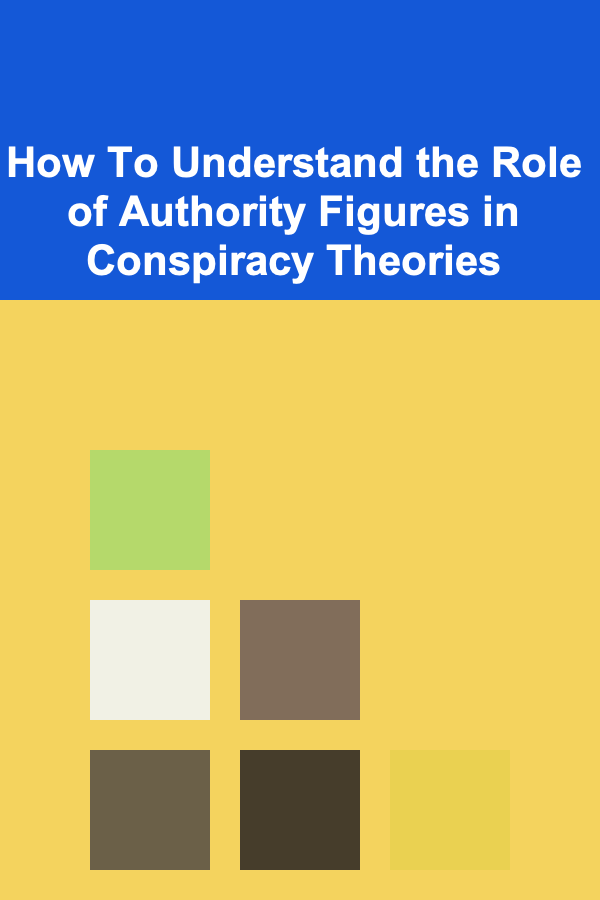
How To Understand the Role of Authority Figures in Conspiracy Theories
ebook include PDF & Audio bundle (Micro Guide)
$12.99$11.99
Limited Time Offer! Order within the next:

Conspiracy theories have existed for as long as human history itself. From ancient rumors about the power structures that control society to modern-day fears about governmental surveillance, conspiracy theories offer alternative explanations to significant events or societal developments. At the core of these theories often lies a distrust of authority figures---individuals or institutions who hold power or influence over others. Understanding the role of these authority figures in the development, spread, and persistence of conspiracy theories requires examining how authority, influence, and power dynamics shape the way people perceive the world and their place within it.
In this article, we will explore the complex relationship between authority figures and conspiracy theories. We will delve into how these figures are perceived by the public, why they become central to conspiracy narratives, and how the distrust in authority figures can fuel the spread of conspiracy theories. By understanding these dynamics, we can better appreciate the psychological, social, and cultural forces at play in the ongoing fascination with conspiracy theories.
The Nature of Authority and its Influence
Before diving into the specifics of conspiracy theories, it's essential to define what we mean by authority. Authority, in its most basic form, refers to the power or right to give orders, make decisions, and enforce obedience. Authority figures can take many forms: political leaders, government officials, law enforcement, business magnates, scientists, and even celebrities. They are individuals or entities that have influence over society, whether through formal power structures or informal means of persuasion and leadership.
The role of authority figures in society is both crucial and complex. They maintain social order, enforce laws, and provide direction in times of crisis or uncertainty. However, authority figures also wield significant power, which can lead to abuses of power, corruption, and manipulation. When authority figures are seen as untrustworthy or self-serving, they become prime subjects in the formation of conspiracy theories.
Conspiracy theories often thrive in environments where people feel powerless, confused, or alienated. In such contexts, authority figures are often painted as malevolent actors who manipulate events for their own benefit, conspiring in secret to deceive the public. These figures, once seen as trustworthy, become central to the narratives that conspiracy theorists create to explain why things happen the way they do.
How Authority Figures Become Central to Conspiracy Theories
At the heart of many conspiracy theories is the idea that powerful individuals or institutions are secretly controlling or manipulating events for a particular agenda. These theories often rely on a few key characteristics of authority figures:
- Access to Information: Authority figures, particularly government officials, have access to information that the general public does not. This disparity in knowledge can fuel suspicion, leading people to believe that these figures are hiding something from the public or intentionally distorting the truth.
- Control of Institutions: Authority figures often control institutions---be they political, corporate, or scientific. This control gives them the ability to shape narratives, influence public opinion, and even suppress information that contradicts their interests.
- Power Over Others: Authority figures hold power over people's lives in various ways, from making laws to directing economic policies. This power can lead to feelings of helplessness or fear among the public, which can be exploited by conspiracy theories that claim authority figures are using their power to manipulate events.
- Historical Precedents of Abuse: There are numerous historical examples of authority figures engaging in covert actions that betray public trust, whether it's government cover-ups, corporate malfeasance, or military interventions. These real-world examples provide fertile ground for conspiracy theorists to build on, creating narratives that suggest similar actions are taking place in secret.
Given these characteristics, authority figures become central to the narratives of conspiracy theories because they represent the embodiment of power---power that is often perceived as being used against the interests of the public. As a result, they become figures of suspicion, and any action or event that cannot be easily explained is often attributed to their hidden motives.
Government and Political Authority
One of the most common and enduring targets of conspiracy theories is the government. Governments have access to vast amounts of information, control over law enforcement agencies, and the ability to influence public life on a massive scale. Because of this, governments are often seen as the main actors behind the conspiracies that shape world events.
Conspiracy theorists often argue that governments manipulate events to maintain or expand their power. The idea that governments hide information from the public, engage in covert operations, or orchestrate events for political gain is central to many conspiracy theories. The notion of "secret agendas" has been applied to a wide range of political events, from assassinations to economic crises. This mistrust of government institutions is often fueled by instances of real political corruption or cover-ups, which are then magnified in conspiracy narratives.
For example, the Watergate scandal in the United States, in which members of the Nixon administration attempted to cover up a break-in at the Democratic National Committee headquarters, led to widespread skepticism about the integrity of government institutions. Over time, this incident contributed to the growing belief that powerful government figures are capable of engaging in secretive, manipulative actions to achieve their objectives.
Corporate Authority and Power
Corporations, like governments, hold significant influence in modern society. Large multinational companies control vast amounts of wealth and resources, giving them the power to shape economies, influence political decisions, and affect public life in profound ways. It's no surprise, then, that corporations are frequently featured in conspiracy theories as the secretive forces behind global events.
Corporate conspiracy theories often revolve around the idea that powerful business magnates or CEOs are pulling the strings behind the scenes to advance their own interests. These interests may include market manipulation, environmental degradation, or even the development of technologies that control or harm the public. Conspiracy theorists point to the role of corporations in shaping public opinion, buying off politicians, and suppressing competing ideas as evidence of their covert operations.
A well-known example of corporate conspiracy theories involves pharmaceutical companies. The idea that these companies prioritize profit over public health has been central to various conspiracy theories, especially those related to vaccines, medical treatments, and the promotion of certain drugs. The belief that pharmaceutical companies have hidden knowledge or suppressed cures in order to maximize profit has been a major driver of vaccine hesitancy and other health-related conspiracy theories.
Scientific Authority and Knowledge Control
Science is often seen as a beacon of truth, providing objective, evidence-based explanations for the world around us. However, when scientific findings contradict people's beliefs or when there is a perceived conflict of interest in scientific research, authority figures within the scientific community can become targets of conspiracy theories. This is particularly true when scientific conclusions are seen as threatening to certain ideological or political interests.
Scientific authority figures, such as researchers, doctors, and experts, are sometimes accused of being "in on the secret" or of manipulating data to suit the agendas of powerful elites. Theories about climate change, for example, have often been framed as a conspiracy orchestrated by scientists in collaboration with political or corporate elites. Conspiracy theorists claim that climate change is a hoax created by governments and corporations to control the public or create profit opportunities.
In some cases, conspiracy theories even accuse scientists of being part of a vast, global network working to deceive the public about fundamental issues like health, disease, and technology. The belief that authority figures within the scientific community are manipulating data or hiding information is a central theme in many conspiracy narratives, especially when people feel that their own worldview is being threatened.
The Psychological Roots of Mistrust in Authority
To understand why authority figures are so often targeted in conspiracy theories, we must consider the psychological roots of mistrust. Psychologically, conspiracy theories thrive in environments where people feel powerless, uncertain, or anxious. Authority figures, by virtue of their control over information and institutions, represent both the source of that powerlessness and a potential threat to personal autonomy.
There are several psychological mechanisms that contribute to this mistrust:
- The Need for Control: People are often uncomfortable with uncertainty and unpredictability. Conspiracy theories offer an alternative explanation that provides a sense of control over seemingly random or chaotic events. By identifying a hidden force (such as an authority figure) behind the scenes, people can feel that they understand the world and have a way to interpret events that might otherwise feel overwhelming.
- Cognitive Biases: Cognitive biases, such as the confirmation bias (the tendency to favor information that supports existing beliefs) and the proportionality bias (the tendency to believe that significant events have equally significant causes), play a significant role in the spread of conspiracy theories. These biases make it easier for individuals to see authority figures as the masterminds behind complex or unexplained events.
- Fear of Powerlessness: Conspiracy theories often reflect a deep-seated fear of powerlessness and a lack of control over one's circumstances. Authority figures, by their very nature, hold power over others, and this can trigger feelings of vulnerability. In response, conspiracy theories offer an explanation that assigns blame to those in power, helping people make sense of their feelings of helplessness.
- Social and Cultural Influences: In many societies, there is a strong cultural undercurrent of distrust toward authority. Whether due to historical events like government betrayals, corporate scandals, or scientific controversies, many individuals grow up with a deep suspicion of those in power. This cultural mistrust provides fertile ground for conspiracy theories to take root and spread.
Conclusion
Authority figures, whether political leaders, corporate executives, or scientific experts, play a central role in the development and persistence of conspiracy theories. These figures are seen as the gatekeepers of knowledge, control, and power, making them prime subjects for suspicion and distrust. As conspiracy theories continue to evolve in the modern era, they will likely remain deeply entwined with perceptions of authority and the power structures that shape our lives. Understanding the role of authority figures in these narratives helps us better comprehend the psychological and social forces that drive the belief in conspiracies and the ways in which power, control, and mistrust intersect in the formation of these theories.

Do-It-Yourself Repairs: Simple Fixes to Save Money and Boost Your Skills
Read More
How to Sort and Store Hair Care Products Effectively
Read More
How to Understand the Stoic View on Wealth
Read More
How to Understand the Role of Enzymes in Digestion and Health
Read More
How to Start a Co-working Space
Read More
How To Hydrate Mature Skin for Suppleness
Read MoreOther Products

Do-It-Yourself Repairs: Simple Fixes to Save Money and Boost Your Skills
Read More
How to Sort and Store Hair Care Products Effectively
Read More
How to Understand the Stoic View on Wealth
Read More
How to Understand the Role of Enzymes in Digestion and Health
Read More
How to Start a Co-working Space
Read More